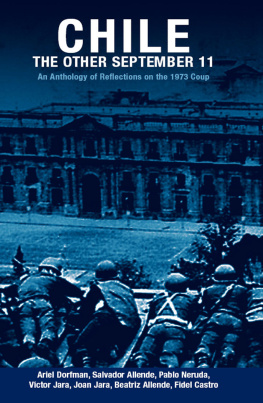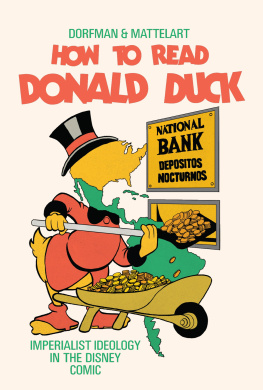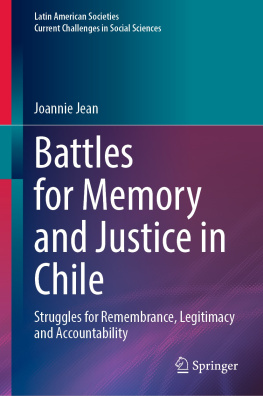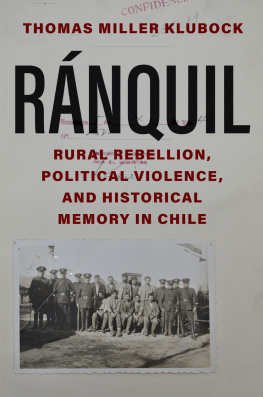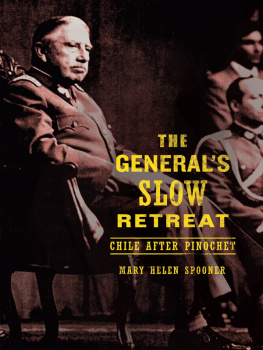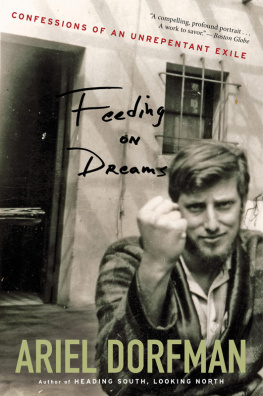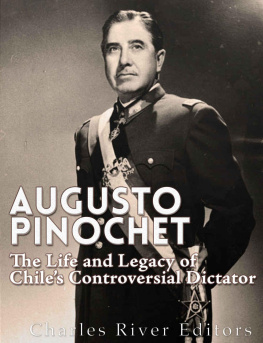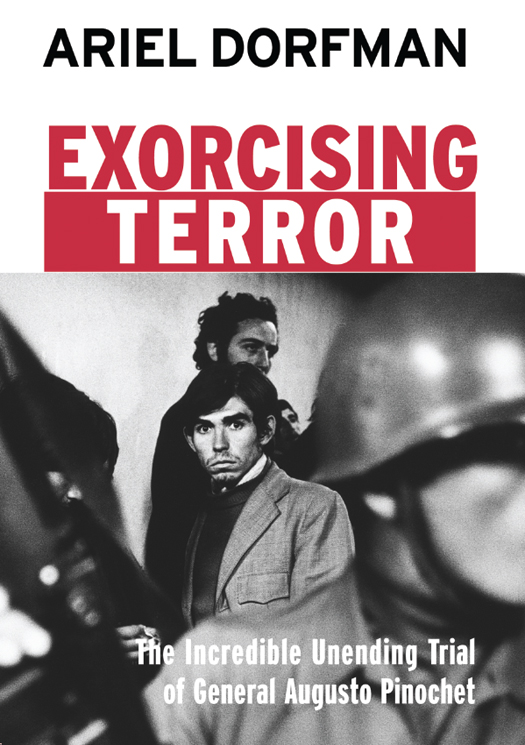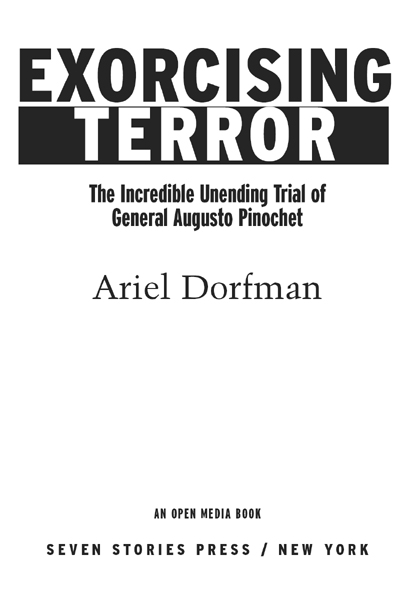Copyright 2002 by Ariel Dorfman
A Seven Stories Press First Edition
An Open Media book
All rights reserved. No part of this book may be reproduced, stored in a retrieval system, or transmitted in any form, by any means, including mechanical, electric, photocopying, recording or otherwise, without the prior written permission of the publisher.
eISBN: 978-1-60980-208-0
Text and cover design by Jon Gilbert
Cover photo David Burnett
v3.1
CONTENTS
FIRST EPILOGUE
The Shadow of Chile
SECOND EPILOGUE
The Long Good-Bye to Tyrants
DEDICATION
IF YOU VISIT THE Cementerio General in Santiago, Chile, you will find, to one side and hugging its outskirts, a large, extended granite memorial, a Wall of Memory erected there in February of 1994, a few years after democracy returned to my country. A numbermore than four thousandof names have been chiseled into its surface, all of them victims of the security forces of General Augusto Pinochet during his dictatorship, which lasted from September 11, 1973, until March 11, 1990. Next to the names of 1,002 men and women on that wall no date of death has been engraved: These are the desaparecidos, the disappeared, whose families have not yet been able to bury them. Nor is the surface of the wall entirely full: The sculptor and architects left an enormous swath of stone to one side with no inscriptions. They anticipated that space would be needed for new casualties to be written down and, in fact, slowly and hesitantly, other familiesnow that they no longer fear reprisalshave decided to announce the execution or disappearance of their loved ones. When I visited a Mapuche village in the faraway foothills of southernChile some years ago, the elders told me that they would not report many of those who were massacred during the dictatorship for fear that the soldiers would someday come back and wreak vengeance. The wall will never contain all the names still hidden in the mists of fear and forgetfulness.
This book is dedicated to five friends whose names are on that wall in our cemetery in Santiago:
Freddy Taberna, who was executed by a military firing squad in Pisagua on October 30, 1973. His body was never returned to his family for burial.
Diana Aron, who was shot and wounded by the Chilean secret police on November 18, 1974, and taken to the torture house of Villa Grimaldi in Nuoa. Her body has still not been recovered.
Fernando Ortiz, who was arrested on December 15, 1976, at Plaza Egaa in Santiago by members of the Chilean secret police in the presence of numerous witnesses. The authorities denied having him in custody. In 2001, information was released by the military indicating that his remains might be buried somewhere in a forsaken and desolate range of hills known as the Cuesta Barriga in central Chile. The bones that were discovered there, after months of false leads and hard digging, proved, through DNA testing, to belong to the man who had once been Fernando Ortiz.
Rodrigo Rojas Denegri, who on July 2, 1986, was burnt alive by a squad of soldiers and then transported to the other side of Santiago and left for dead in a ditch. Four days laterat the age of nineteenhe died of his wounds in a Santiago hospital.
And Claudio Jimeno, who was arrested at the presidential palace of La Moneda in Santiago on September 11, 1973. For almost thirty years he had been missing, and then news from Santiago confirmed that his body, along with the bodies of several other advisers to former President Salvador Allende, had been dynamited the day after the coup, blown to bits so that no one would ever be able to find it or prove the tortures that had been inflicted upon it. Excavations in a military fort by an investigating judge led to the discovery of fragments of a bone that, identified as Claudios, will now, apparently, allow him to be buried.
But this dedication, like the wall itself, like this book, can never really be complete.
Not if we remember this: The Chilean memorial does not include the names of those who lost their jobs and their homes and their health insurance and their pensions after the 1973 coup, a number estimated to be over a million. It does not include the men from the shantytowns who, night after night, were rounded up by patrols and beaten and made to stand at attention, naked, in a soccer field while beyond the glaring spotlights their wives and mothers and children were forced to watch. Nor do the names on the wall include almost a million exiles or migrantsclose to one tenth of Chiles population at the time of the military takeover.
And the wall cannot, of course, include this memorythat was told to me by someone, a man who asked me many years ago not to reveal his name if I ever told his story:
I was taken down into that basement, stumbling because of the tape over my eyes, taped like a second skin to my skin. Those hands scratched me as they tore the clothes, You son of a bitch, now youll see what we do to bitches like you. Their fingernails were dirty, it was crazy that I should be worrying about getting an infection from those dirty fingernails, I had spent the last two weeks with hardly any food, unable to relieve myself, I was filthy and must have smelled worse than the worst sewer, but I nevertheless couldnt keep my mind off those fingernails, afraid that they would give me some sort of sickness. That was before they strapped me to the cot, one hand and then the other one, and someone else was binding my ankles, spreading me out under what must have been a blazing lightbulb. And then they attached somethinga wire, a clasp, what was it?they attached it to my genitals and then that voice said, Lets make him dance, lets make him sing, lets fuck him over. And then they made me dance. And they made me sing.
No, the wall does not include hundreds of thousands who were tortured and who survived, it does not include their memories.
PROLOGUE
DURING THE 1973 COUP , Chiles new military leaders, finding themselves with an excess of political prisoners on their hands, hit upon what must have seemed like an ingenious idea: Turn the National Stadium, our largest sports arena, into a gigantic concentration camp. Then, a few months later, after thousands of dissidents had been arrested and tortured, after hundreds had been interrogated and executed, the authorities scrubbed the floors and painted the benches and reopened the coliseum to the public. The referees again blew their whistles, the ball once again thudded across the field and gradually soccer fans began coming back.
Ten years after the coup dtat, when I was allowed back from exile, finally allowed back to Chile, one of the decisions I made was not to visit that stadium, and for the next seven years, living in my country at times and at other times visiting it, I kept that vow. It was only when democracy returned that I was also able to return myself to that place where I had watched so many sports events in democratic times. What I had desperately needed was to witness some sort of act that would transform the stadium, that would reject its purported normality as obscene and confront the terrible pain still echoing there, and on March 12, 1990, the day after Pinochet gave up the presidency to Patricio Aylwin, the people of Chile performed that act of exorcism against the backdrop of the majestic Andes. Seventy thousand supporters gathered in the stadium to listen to the new democratic president in his first official encounter with the renewed landand Aylwin did not let us down. In his speech he referred to the horrors that had happened in these stands and on this field and pledged


